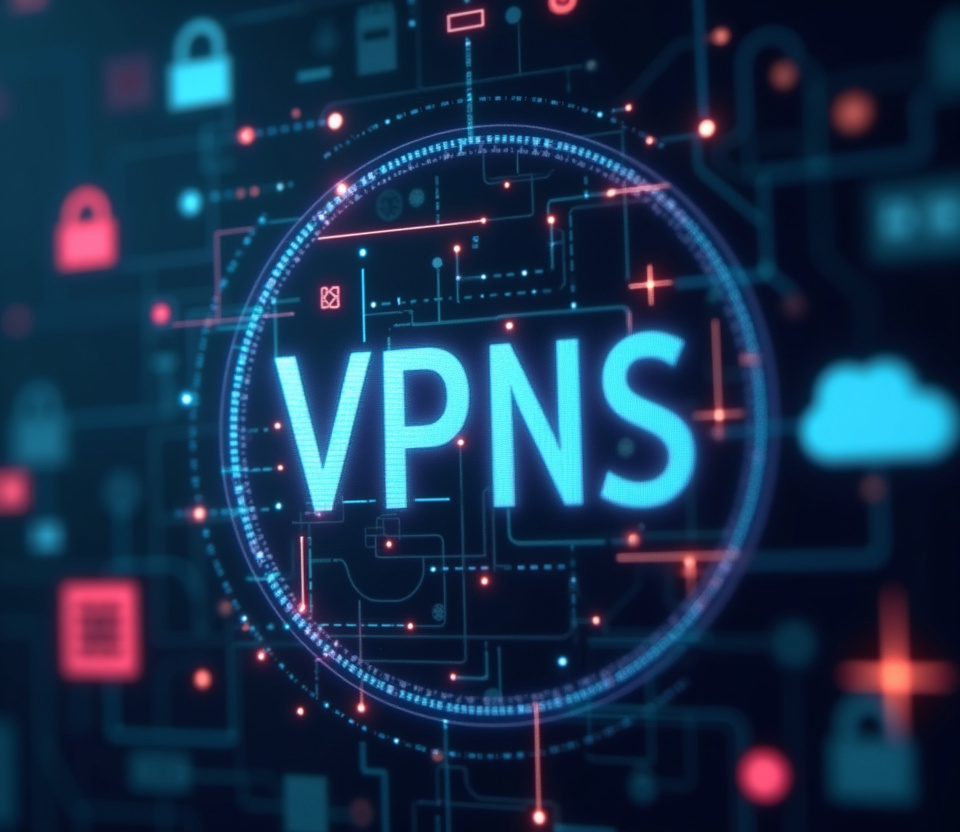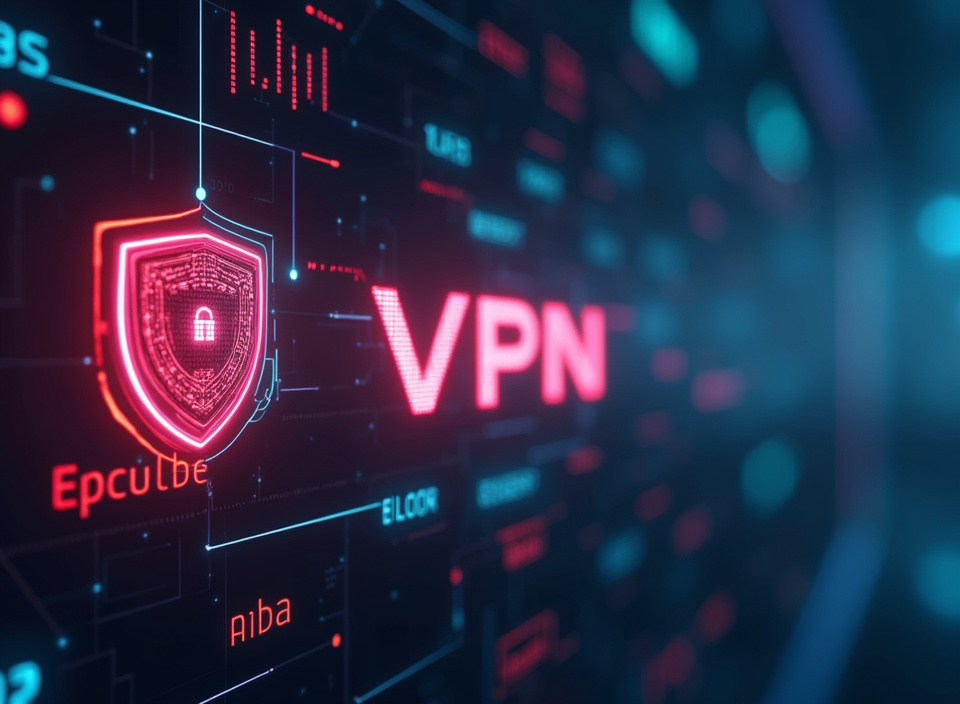VPNs for Tech Startups: Strengthening Data Infrastructure

Table of Contents
The Growing Need for Cybersecurity in Agile Startups
In today's hyper-connected world, tech startups face a unique set of challenges when it comes to data security and infrastructure management. Unlike established enterprises with mature IT departments and robust security budgets, startups often operate with limited resources, making them particularly vulnerable to cyber threats. This article delves into a critical component of any modern startup's security strategy: the implementation of a Virtual Private Network (VPN).
Far from being a luxury, a robust VPN solution is an essential tool for protecting sensitive data, securing remote access, and ensuring the overall integrity of the data infrastructure. We will explore how a 'startup VPN' implementation is non-negotiable, considering the delicate nature of intellectual property, customer data, and financial information that tech startups handle. The vulnerability of data infrastructure can lead to catastrophic consequences, ranging from financial losses and reputational damage to legal liabilities and even business closure, and the need for 'cyber protection'.
Therefore, integrating a secure VPN into the data infrastructure is a proactive step that demonstrates a commitment to safeguarding the startup's assets. A well-configured VPN acts as a crucial line of defense against various cyber threats, including data breaches, malware infections, and man-in-the-middle attacks. Its functionalities extend to encrypting all data transmitted over public networks, masking IP addresses to obscure the startup's location, and providing a secure tunnel for remote employees and collaborators to access internal resources.
Encryption, in particular, is paramount, as it renders data unreadable to unauthorized individuals who might intercept it during transmission. The masking of IP addresses adds another layer of anonymity, making it difficult for attackers to pinpoint the startup's physical location and launch targeted attacks. The secure tunnel facilitates remote work and collaboration, allowing employees to access sensitive data and applications from anywhere in the world without compromising security.
Securing the 'network security' of a startup is also critical for attracting investors and partners who prioritize data protection. In an age where data breaches are increasingly common, investors and partners are more likely to scrutinize a startup's security posture before committing their resources. Demonstrating a proactive approach to security can instill confidence in stakeholders and differentiate the startup from competitors with weaker security postures.
A strong security record can be a significant competitive advantage. Furthermore, many industries are subject to stringent data protection regulations, such as GDPR and HIPAA. Implementing a VPN helps startups comply with these regulations by ensuring that sensitive data is processed and transmitted securely.
This is particularly important for startups operating in regulated sectors like healthcare, finance, or education. Compliance with these regulations is not only a legal requirement but can also provide a competitive edge by allowing companies to offer more secure and compliant services to their customers. Non-compliance can result in hefty fines, legal action, and reputational damage.
The choice of VPN solution should be based on a thorough assessment of the startup's specific needs and risk profile. Factors to consider include the number of users, the volume of data transmitted, the required level of security, and the budget. It is crucial that 'VPN for tech startups' prioritize protocols with robust encryption algorithms and strong authentication mechanisms.
OpenVPN, IKEv2/IPsec, and WireGuard are all considered secure options. Each offers a unique set of features and performance characteristics, so careful evaluation is necessary. The chosen VPN provider should also have a clear and transparent privacy policy, guaranteeing that user data is not logged or shared with third parties.
This commitment to privacy is essential for maintaining user trust and complying with data protection regulations. Regularly auditing the VPN configuration and security protocols is critical to ensuring its effectiveness and compliance with industry best practices. Security configurations need maintenance, so it's crucial to conduct periodic security audits.
Audits should be accompanied with timely updating of security policies. This provides ongoing assurance that the VPN is protecting the startup's data and systems effectively. Such activities are part of a startup's commitment to best practice.
The establishment of a robust 'data infrastructure' necessitates careful planning and strategic oversight. It's not simply about acquiring the latest technology but also about establishing policies and procedures that govern data access, storage, and transfer. A VPN is an essential element in this framework, enabling the secure movement of data both within the organization and externally.
It acts as a secure conduit for applications, services, and resources that comprise the entire data infrastructure. Consider the increasingly common scenario of startups using cloud-based services. While cloud providers invest significantly in security, the security of data in transit between the startup and the cloud provider remains the startup's responsibility.
A VPN provides a secure tunnel for this traffic, protecting it from eavesdropping and manipulation. This benefit holds true whether it is data streamed through an application, synchronized files, or routine system updates. The risk of data interception during transmission is substantial, particularly when using public Wi-Fi networks.
A VPN ensures that even if the data is intercepted, it will be unreadable to unauthorized parties. Moreover, a VPN can facilitate secure collaboration with remote teams, consultants, or partners. It allows them to securely access internal resources such as file servers, databases, and development environments, regardless of their location.
This capability is particularly important for tech startups that often rely on geographically dispersed talent and partnerships. Secure access to internal resources is critical for maintaining productivity and ensuring that remote workers can contribute effectively. Without a VPN, remote access can expose the startup to significant security risks.
With the correct safeguards in place, startups can grow their infrastructure without compromising data security. For example, a 'VPN for tech startups' can ensure the security of source code repositories. These repositories contain the lifeblood of the company's intellectual property.
Unauthorized access to these repositories could lead to code theft, security vulnerabilities, or even the cloning of the startup's core technology. Protecting these repositories is essential for maintaining a competitive edge. A VPN can restrict access to authorized personnel and provide an additional layer of 'cyber protection' for this critical asset.
Implementing multi-factor authentication (MFA) alongside the chosen VPN protocol should also be strongly considered. This further strengthens security by requiring users to provide multiple independent factors of verification, such as a password and a one-time code generated by a mobile app. This makes it much harder for attackers to gain unauthorized access, even if they manage to steal a password.
MFA is another crucial addition to password based network security schemes where users are using weak or shared passwords amongst different online services, with this measure startups can be better protected. A centrally managed VPN solution simplifies administration and enhances 'network security'. It enables IT staff to monitor VPN usage, enforce security policies, and quickly respond to security incidents.
Centralized logging and auditing features provide valuable insights into network activity and can help detect suspicious behavior or potential security breaches. Efficient network security protocols are critical for providing early warning for potential attacks. This allows for faster risk identification and easier damage control activities.
Choosing the right VPN can significantly enhance the 'data infrastructure' efficiency of a startup. For example, some VPN solutions offer traffic prioritization and quality of service (QoS) features, which can improve the performance of latency-sensitive applications like video conferencing and VoIP. This ensures that critical business communications are not disrupted by network congestion.
QoS mechanisms can be configured to prioritize different types of traffic based on their importance. This ensures that critical applications receive the bandwidth they need to function properly. Finally, the VPN setup should integrate into the current security architecture and follow security by design principles.
The VPN is not a standalone security technology; and it is one aspect of a defense in depth approach. It should be considered how to respond to security events or incidents, and integrate the VPN into monitoring workflows to get early warning whenever suspicious behavior occurs.
Effective 'network security' extends far beyond just implementing a VPN. It requires a holistic, layered approach that encompasses multiple security controls and addresses all potential attack vectors. The VPN acts only as one component in this complex ecosystem but it serves as a crucial foundation upon which other security measures can be built.
Thinking of the VPN as a fortress gate is helpful. The gate will protect the network only if the wall is strong, well-guarded and supported by a good number of archers and soldiers. The layering of security features will allow for protection against various attacks.
One of the most common threats to startups is phishing attacks that aim to steal user credentials or deploy malware. Startups should educate their employees about phishing techniques, such as deceptive emails and websites, and encourage them to be cautious when clicking on links or opening attachments. Phishing simulations can be an effective way to test employee awareness and identify areas for improvement.
Educating employees should be considered a continuous activity due to attackers constantly improving phishing techniques. Another key security measure is implementing a strong password policy. Startups should require employees to use complex, unique passwords and to change them regularly while enforcing two-factor authentication wherever possible.
Password managers can help employees generate and store strong passwords securely. Password hygiene is a paramount task in security, and implementing appropriate controls will help to limit the risk. Consider security requirements such as password strength, complexity, and secure storage.
Staying on top of software updates and security patches is also critical for maintaining 'network security'. Software vulnerabilities can exploit weaknesses in operating systems, applications, and other software components. Regularly patching these vulnerabilities helps to prevent attackers from gaining access to the startup's systems.
A strong patch program ensures that security risks are kept to a minimum and reduce the attack surface by staying up to date with security patches. Firewalls, both hardware and software, are another essential component of a robust network security strategy. Firewalls act as a barrier between the startup's network and the outside world, blocking unauthorized access and preventing malicious traffic from entering the network.
In addition to VPNs and firewalls, startups also need to implement intrusion detection and prevention systems (IDS/IPS). These systems monitor network traffic for suspicious activity and can automatically block or alert security personnel to potential threats. Intrusion detection and prevention systems offer an invaluable insight into the security aspects of a network and serve as an early warning system for attacks.
Data loss prevention (DLP) solutions can help startups prevent sensitive data from being leaked or stolen. DLP solutions monitor network traffic and endpoints for sensitive data and can automatically block or encrypt it, preventing it from leaving the organization's control. Data must be classified to ensure that it is handled appropriately, and data loss prevention systems can help to provide the appropriate control measures.
Regular security audits and vulnerability assessments are also essential for identifying and addressing potential security weaknesses. These assessments should be conducted by qualified security professionals who can identify vulnerabilities in the startup's systems and provide recommendations for remediation. Security audits will provide ongoing verification of policy adherence and ensure that security risks are minimized and managed appropriately.
Finally, don't forget the importance of physical security. Startups should secure their offices and data centers to prevent unauthorized access. This includes measures such as access control systems, security cameras, and alarm systems.
Only authorized personnel should have access to critical infrastructure. Proper environmental controls also play a crucial role, maintaining stable temperature and humidity levels and protecting equipment from power disturbances. Overall, a combination of technological security controls, employee education, strong security policies, and routine auditing can significantly enhance a startup's 'cyber protection' profile.
Ignoring security could mean the end of your business.
VPNs for Services: Enhancing Security and User Trust
The evolution of 'cyber protection' strategies for tech startups increasingly involves adapting to emerging threats and leveraging advanced technologies. Traditional VPNs, while foundational, may not be sufficient to address the complexities of modern cyberattacks. Startups need to explore next-generation VPN solutions and complementary security tools to fortify their defenses.
One key area of development is the integration of Artificial Intelligence (AI) and Machine Learning (ML) into VPNs. AI-powered VPNs can analyze network traffic in real-time, identify anomalous behavior, and automatically block or quarantine suspicious connections. This proactive approach to security can help startups detect and respond to threats more quickly and effectively.
AI algorithms can learn from past attacks and adapt their defenses accordingly, making them highly resilient to new and evolving threats. For example, AI can be used to identify phishing attempts, detect malware infections, and prevent data exfiltration. Another trend in 'network security' is the adoption of Zero Trust Network Access (ZTNA).
ZTNA is a security model that assumes that no user or device is inherently trustworthy, regardless of whether they are inside or outside the network perimeter. Instead, ZTNA requires all users and devices to be authenticated and authorized before they can access any resources. ZTNA can be implemented alongside a VPN to provide an additional layer of security.
By verifying the identity and posture of every user and device, ZTNA can prevent unauthorized access to sensitive data and applications, even if an attacker has compromised a VPN connection. Microsegmentation is another valuable technique for enhancing 'data infrastructure' security. Microsegmentation involves dividing the network into smaller, isolated segments and implementing strict access controls between them.
This limits the blast radius of a security breach and prevents attackers from moving laterally across the network. For example, a startup could segment its development environment from its production environment, preventing attackers from gaining access to sensitive customer data if they compromise a development server. Cloud-based security information and event management (SIEM) solutions offer startups a scalable and cost-effective way to monitor their security posture.
SIEM solutions collect and analyze security logs from various sources, such as VPNs, firewalls, and intrusion detection systems, to identify potential threats. Cloud-based SIEM solutions can be easily deployed and managed, and they provide startups with real-time visibility into their security environment. Effective SIEM dashboards can provide early warnings and help analysts focus on time-sensitive issues.
Furthermore, startups should consider implementing endpoint detection and response (EDR) solutions. EDR solutions monitor endpoints, such as laptops and desktops, for malicious activity and can automatically block or quarantine infected devices. EDR solutions can also provide valuable forensic data that can be used to investigate security incidents.
EDR systems are an invaluable tool for assessing the impact of successful attacks. Forensic analysis of computer devices is increasingly important in the detection of more sophisticated attacks. Beyond technology upgrades, reinforcing the human layer of security is paramount.
Conduct regular security awareness training to educate your employees about the latest threats and best practices and organize phishing simulations to test their knowledge and reflexes. Establish clear reporting channels for security incidents, which should include straightforward instructions on how to report suspected security breaches or unusual activity. Create a security-conscious culture through transparent security policies and positive reinforcement practices.
Such a cultural shift promotes vigilance and shared responsibility for safeguarding company assets. Ultimately, a forward-thinking approach to 'cyber protection' is not a one-time investment but an ongoing journey of adaptation, learning, and refinement. Building strong partnerships with security vendors can provide access to cutting-edge expertise and proactive threat intelligence.
Prioritizing security will ensure a safe and sustained trajectory for any tech startup in the digital arena.
The Future of VPNs: AI-Powered and Integrated Security Solutions
Maintaining a strong security posture requires constant vigilance and proactive measures. With that said, a 'startup VPN' is not a 'set it and forget it' solution; it demands continuous monitoring, assessment, and adaptation to remain effective against evolving cyber threats. Establishing a routine for security audits should also form part of the standard operations.
This final section focuses on the ongoing maintenance and optimization of VPN solutions within the data infrastructure of tech startups. Firstly, continuous monitoring of the VPN infrastructure is crucial. This involves tracking key performance metrics, such as VPN connection uptime, bandwidth utilization, and security event logs.
Monitoring tools can provide real-time visibility into VPN activity, enabling IT staff to quickly identify and respond to any issues. Early problem detection is crucial for keeping things safe. Automated alerts can be configured to notify administrators of critical events, such as failed login attempts, excessive bandwidth usage, or suspicious network activity.
These continuous monitoring activities are critical for maintaining system performance and preventing potential security incidents. Secondly, regular security audits of the VPN configuration and infrastructure are essential. Security audits should be conducted by qualified security professionals who can identify vulnerabilities and provide recommendations for remediation.
The findings of such checks will help strengthen network security. Regular penetration testing is also required to evaluate and test security protocols in a more practical setting. Results from the audits can be used to guide a cycle of security investment activities.
Security audits should include a review of the VPN's configuration settings, access control policies, encryption protocols, and logging mechanisms. Thirdly, timely updates to VPN software and firmware are critical for addressing security vulnerabilities and ensuring optimal performance. VPN vendors regularly release updates to patch security flaws and improve functionality.
Startups should establish a process for promptly applying these updates to all VPN servers and clients. Procrastinating or ignoring software updates could lead to security risks. A reliable patch management system can help automate this process and ensure that all systems are kept up-to-date.
Additionally, proactive threat intelligence is crucial for staying ahead of emerging cyber threats. Threat intelligence feeds provide information about the latest malware, phishing campaigns, and other cyberattacks. Startups can subscribe to threat intelligence feeds and integrate them into their security systems to automatically detect and block known threats.
An element of proactive threat analysis and detection is important to maintain network security. Security systems can also be configured to automatically block traffic from known malicious IP addresses and domains. Furthermore, creating a documented incident response plan for VPN-related security incidents is critical.
The incident response plan should outline the steps to be taken in the event of a security breach, including containment, eradication, recovery, and post-incident analysis. Incident recovery exercises can help to guarantee and test plans for proper implementation. The incident response plan should be regularly reviewed and updated to ensure that the data infrastructure is safe and secure.
It is also important to define roles and responsibilities within the incident response team. Finally, regular training for employees on VPN usage and security best practices is crucial for preventing user-related security incidents. Employees should be trained on how to use the VPN securely, how to identify phishing attacks, and how to report security incidents.
This will enable them to use the VPN safely and securely and thus reduce security incidents. Reinforcement of user training through regular awareness exercises is also recommended. In conclusion, the effective maintenance and optimization of a 'startup VPN' are ongoing processes that require constant attention and effort and it also demands constant security investment.
By emphasizing security audits, adopting threat intelligence, preparing a comprehensive incident response plan, and putting resources into staff training, startups can enhance their 'cyber protection' and secure their 'data infrastructure' more effectively. This holistic approach reinforces the importance of the 'network security', safeguarding the startup's assets and fostering a safe environment for innovation and expansion. A strong VPN can enhance data protection for startups and also help to ensure the development of a culture built on security-conscious people.
Stay Updated
Get the latest VPN news, tips, and exclusive deals to your inbox.




